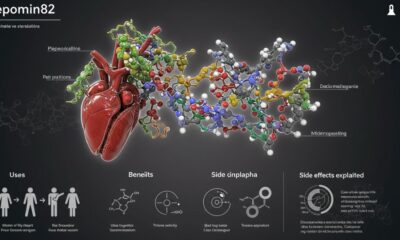Health
Understanding depomin82: Key Features and Benefits Explained

Enter depomin82 a breakthrough that has been making waves in the wellness community. This innovative option promises to offer a new approach for individuals seeking support with mood disorders and cognitive function. Join us as we dive deep into what makes Depomin82 unique, how it works, and why it might just be the solution you’ve been looking for. Whether you’re exploring treatment options or simply want to learn more about this emerging therapy, you’ve come to the right place!
What is Depomin82?
Depomin82 is an innovative compound designed to enhance mental health and cognitive performance. This therapeutic agent has garnered attention for its potential in treating mood disorders, such as depression and anxiety.
Unlike traditional medications, which often come with a lengthy list of side effects, Depomin82 aims to provide a more targeted approach. Its formulation focuses on balancing neurotransmitters in the brain, promoting emotional stability and improved focus.
The name “Depomin82” reflects its unique chemical structure—a blend that sets it apart from other treatments available today. Research suggests that it offers promising results without the common drawbacks associated with conventional options.
As interest grows around this compound, many are eager to explore how it can fit into their wellness journey. Early findings indicate that users may experience enhanced well-being while navigating daily challenges more effectively.
How Does Depomin82 Work?
Depomin82 operates on a unique mechanism that targets specific pathways in the brain. By modulating neurotransmitter levels, it enhances communication between neurons. This can lead to improved cognitive functions and emotional balance.
When ingested, Depomin82 is rapidly absorbed into the bloodstream. It travels to the brain where it interacts with various receptors. This interaction stimulates positive responses, helping reduce anxiety and elevating mood.
The compound works by promoting neuroplasticity, enabling the brain to adapt and reorganize itself more effectively. Users often report heightened focus and clarity of thought after consistent use.
It’s important to note that each individual’s response may vary based on their unique biology and lifestyle factors. Understanding how these elements interact can help users maximize the benefits of Depomin82 in their daily routines.
Key Features of Depomin82
Depomin82 stands out for its innovative formulation designed to enhance cognitive functions.
One of its key features is the powerful blend of natural ingredients that support neurotransmitter activity. This can lead to improved mood and clarity.
Another notable aspect is its user-friendly dosage, making it easy for individuals to incorporate into their daily routines without hassle.
Additionally, Depomin82s prioritizes safety with thorough testing and quality assurance processes in place, ensuring users receive a reliable product.
The formula also boasts fast-acting benefits, with many users reporting effects shortly after consumption.
The product promotes overall well-being by addressing various aspects of mental health, including stress management and emotional balance.
Benefits of Using Depomin82
Using Depomin82 offers numerous advantages for those seeking enhanced mental clarity and emotional balance. One of the standout benefits is its ability to boost mood stability, which can lead to improved daily interactions.
Many users report increased focus and productivity after incorporating Depomin82 into their routines. This can be a game-changer for professionals and students alike, allowing them to tackle tasks with renewed energy.
Additionally, this formula supports better sleep patterns. Quality rest plays a crucial role in overall well-being, making it easier to face challenges each day.
Another remarkable feature is its natural composition. Users appreciate knowing they are choosing a product that aligns with healthier lifestyle choices while avoiding harsh chemicals or stimulants.
Community feedback highlights how Depomin82 fosters resilience against stressors. By enhancing coping mechanisms, individuals feel empowered in managing life’s ups and downs more effectively.
Real-Life Success Stories with Depomin82
Many users have experienced remarkable transformations with Depomin82. Take Sarah, for example. Struggling with anxiety, she found her daily life impacted significantly. After incorporating Depomin82 into her routine, she noticed a calming effect that allowed her to engage more fully in social activities.
Then there’s Mark, who battled chronic fatigue. He was skeptical at first but decided to give Depomin82 a chance. Within weeks, he reported increased energy levels and enhanced productivity at work.
Even professionals are sharing their experiences. A therapist noted improvements in clients’ moods and focus after using the product as part of their wellness plans.
These stories illustrate how varied and impactful the effects of Depomin82s can be across different lifestyles and challenges. Each individual’s journey highlights its potential as a supportive tool in achieving mental clarity and emotional balance.
Alternatives to Depomin82
When exploring alternatives to depomin82, several options stand out for their unique properties and benefits.
One popular alternative is **Citalopram**, known for its effectiveness in treating depression and anxiety disorders. It works by increasing serotonin levels in the brain, similar to depomin82.
Another contender is **Sertraline**. This selective serotonin reuptake inhibitor (SSRI) offers a well-supported profile for managing various mental health issues while minimizing side effects.
For those interested in herbal remedies, **St. John’s Wort** has gained attention as a natural antidepressant. Although it may not suit everyone, some individuals find relief from mild depression symptoms with this plant-based option.
Lastly, **Mindfulness-Based Stress Reduction (MBSR)** programs can be valuable for enhancing overall mental well-being without medication. They focus on meditation and awareness techniques that help reduce stress and improve mood over time.
Each of these alternatives provides different mechanisms or approaches to support mental health needs effectively.
Conclusion:
Depomin82 stands out in the realm of innovative solutions. Its unique formulation addresses specific needs with precision.
Users often find themselves impressed by its performance and adaptability. Many appreciate how it seamlessly fits into their routines, enhancing overall well-being.
Exploring Depomin82 opens up new avenues for individuals seeking effective support. The testimonials speak volumes about its impact on daily life.
FAQ’s
What is Depomin82 used for?
Depomin82 is primarily utilized to support mood stabilization and enhance emotional well-being. It can be beneficial for those dealing with anxiety, depression, or stress-related conditions.
How does Depomin82 work?
Depomin82 works by influencing neurotransmitter levels in the brain. This modulation helps to promote a balanced mood and reduce symptoms associated with mental health disorders.
Are there any side effects of using Depomin82?
While many users report positive outcomes, some may experience mild side effects such as headaches or gastrointestinal issues. It’s always wise to consult a healthcare professional before starting any new supplement.
Health
Safe and Supportive Pediatric Positioning for Rehabilitation

Ensuring that children are safely and comfortably positioned during rehabilitation is crucial to their recovery, health, and quality of life. Optimal positioning helps support physiologic functions, prevents secondary complications, and enhances each child’s participation in daily activities. For families and caregivers, selecting the right pediatric rehab equipment can significantly improve their child’s outcomes and comfort during this journey.
Thoughtful pediatric positioning not only provides immediate benefits in comfort and safety but also helps develop proper posture, prevent contractures, and avoid pressure injuries. With the right strategies and resources, the home environment can be a safe and effective setting for ongoing rehabilitation. It is vital for parents and support teams to understand and implement evidence-based techniques to feel confident in their approach.
Importance of Proper Positioning
Pediatric rehabilitation focuses on helping children achieve their highest level of independence while ensuring their safety and comfort. Proper positioning is essential for preventing pressure sores, improving respiratory function, and enhancing overall well-being. For children with limited mobility or developmental challenges, safe positioning can make everyday activities less stressful and reduce the likelihood of health complications.
Children with special needs may be at increased risk for pressure injuries, joint contractures, and respiratory issues if not properly supported. Consistent positioning strategies can prevent deformities by preserving joint range of motion and supporting muscle tone. Families can work with rehabilitation professionals to develop individualized plans tailored to their child’s unique medical and therapeutic requirements.
Effective positioning also improves a child’s engagement with their environment and enables them to participate fully in play, therapy, and social interactions. According to the American Physical Therapy Association, early and active positioning can also aid in overall child development, aligning with critical milestones in physical growth and function.
Common Positioning Techniques
There are several essential positioning techniques regularly employed by caregivers and therapists in pediatric rehabilitation. Each technique offers specific benefits based on the child’s needs, and all require proper assessment to maximize results and mitigate risks.
- Supine Position: The child lies on their back with their head supported. This position helps maintain spinal alignment, allows for relaxation, and simplifies monitoring of breathing and muscle tone.
- Prone Position: The child lies on their stomach, which encourages head lifting and strengthens the neck, back, and shoulder muscles. Prone positioning can also expand lung capacity and assist in digestive health.
- Side-Lying Position: Lying on the side with padding to maintain posture can relieve pressure on specific areas, provide comfort, and facilitate certain therapeutic activities.
Therapists may also recommend alternative techniques, such as supported sitting or upright standing (with assistive aids), depending on rehabilitation goals. The right strategy depends on continual assessment and the child’s evolving health status.
Assistive Devices for Positioning
Assistive devices enable caregivers to safely position children who may otherwise be unable to maintain alignment independently. Selecting the correct device improves comfort, enhances function, and prevents undue stress on muscles and joints.
- Positioning Aids: Wedges, rolls, bolsters, and foam supports help maintain or correct posture, especially when lying or sitting for extended periods.
- Adaptive Seating: Customized seats, often with harnesses or contoured bases, provide stability and promote proper alignment of the pelvis and trunk, thereby significantly improving function and interaction with the environment.
- Orthotic Devices: Splints and braces are recommended for children at risk of muscle contractures or skeletal deformities. These are fitted to the child and are often used in therapeutic routines under supervision.
Professional assessment is critical before choosing and using any assistive device, as improper use can lead to discomfort or even harm.
Guidelines for Safe Positioning at Home
Translating hospital or clinic protocols to the home environment is an essential part of pediatric rehabilitation. Caregivers should adopt best practices to ensure safety while promoting the child’s participation and independence.
- Change the child’s position every two hours to prevent the development of pressure injuries or sores.
- Always check and maintain alignment of the head, neck, and spine with appropriate support for the limbs.
- Use soft, supportive pillows and cushions to stabilize positioning and maximize comfort.
- Monitor frequently for signs of red or irritated skin, pain, or swelling, and adjust the position accordingly.
- Communicate with your child throughout the process to encourage engagement and recognize discomfort early.
Role of Physical Therapy in Positioning
Physical therapists are essential partners in a child’s rehabilitation journey. From the initial evaluation, therapists help identify positioning needs and collaborate with families to design safe positioning routines and select optimal equipment. They also adapt strategies over time, ensured by regular follow-up to address the child’s changing needs.
Therapy sessions often incorporate both passive and active positioning so children can participate directly, while caregivers observe and learn techniques to replicate at home. Ongoing physical therapy involvement results in improvements in muscle strength, range of motion, and overall participation that are both measurable and noticeable in daily life.
Monitoring and Adjusting Positioning Strategies
Continuous assessment is a crucial part of pediatric positioning. Both caregivers and clinicians must remain vigilant for early signs of discomfort, pressure injuries, or unintended consequences of specific aids or techniques. Frequent feedback from the child and team discussions helps ensure that strategies remain effective and adapt to new challenges as the child grows or recovers.
If issues arise, such as redness, indentations, or pain, caregivers should immediately reassess and seek guidance from their healthcare team. Thorough documentation and open communication among all care providers will support timely adjustments, preventing future complications and supporting an optimal recovery trajectory.
Conclusion
A secure and encouraging positioning strategy is crucial for achieving positive outcomes in pediatric rehabilitation. Recognizing the significance of correct positioning, utilizing suitable methods, and collaborating with physical therapists and other professionals in the care plan allows children to experience increased comfort, improved function, and a higher quality of life. Regular use of top-quality pediatric rehabilitation equipment, family education, and careful monitoring help make each child’s rehabilitation process as safe and effective as possible.
Health
Advances in Patient-Focused Healthcare Solutions

The modern healthcare landscape is rapidly evolving, with new technologies emerging to address the pressing needs of patients worldwide. Hospitals, clinics, and healthcare providers are increasingly turning to digital innovations, such as electronic health records and artificial intelligence, to deliver more efficient and tailored services. These cutting-edge approaches empower individuals to become active participants in their care while enhancing the quality and accessibility of treatment for everyone involved. For those seeking the latest updates and offerings in pharmaceutical products Canada, technology-driven healthcare transformation is having a direct impact on the industry.
By investing in solutions that prioritize patient experiences and personalized outcomes, medical professionals are better equipped to diagnose, treat, and monitor a wide spectrum of health conditions. Advanced tools not only speed up diagnosis but also open new opportunities for delivering remote care and real-time patient engagement, all while maintaining a focus on individual needs.
These advancements are also paving the way for more holistic and comprehensive patient management strategies. Whether through remote monitoring devices, digital health platforms, or advanced analytics, the collective goal is to create a patient-centered healthcare system that is responsive, accessible, and adaptive to the changing demands of modern society.
Patients today are more informed than ever before, thanks to the digital revolution and increasing emphasis on patient education. This shift in focus not only fosters trust and collaboration between patients and their healthcare providers but also ensures that care is more responsive to unique individual circumstances and preferences.
Artificial Intelligence in Healthcare
Artificial intelligence is revolutionizing the way healthcare providers deliver patient care. By leveraging advanced algorithms, AI-powered tools can process vast amounts of medical data in real time. This leads to earlier and more accurate diagnoses for conditions such as sepsis, cancer, and cardiovascular disease, helping to lower mortality and morbidity rates. According to Forbes, AI applications are projected to save the healthcare economy $150 billion by 2026.
Mobile Health Solutions
Mobile health (mHealth) applications are bringing healthcare directly into patients’ hands, transforming access and engagement. These platforms allow users to easily communicate with providers, schedule appointments, and receive timely reminders, all from their mobile devices. Secure messaging and medical record access have greatly improved patient satisfaction, allowing individuals to be at the center of their care process. Companies and clinics leveraging mHealth can offer more responsive support and build lasting, trust-based relationships with their patients.
Wearable Technology
Wearable technologies are changing the landscape of continuous health monitoring and disease prevention. Devices such as fitness trackers, smartwatches, and medical-grade biosensors monitor vital signs and behaviors around the clock, providing actionable insights both to the user and their healthcare provider. Patients can now track their heart rate, blood pressure, sleep patterns, and more, using this data to stay informed about their health and intervene earlier when issues arise. The use of wearables enhances clinicians’ ability to craft personalized treatment plans based on real-time information collected outside traditional clinical settings.
Interactive Patient Care Systems
Interactive patient care (IPC) systems bring an innovative and engaging element to the patient experience, especially during hospital stays. These in-room technologies provide access to educational content, entertainment, and real-time feedback tools, all designed to foster a positive and informed environment for recovery. IPC systems can sync with electronic health records to deliver tailored educational modules specific to an individual’s condition, medication, or aftercare needs. This increased engagement has been shown to drive better health outcomes through improved compliance and patient satisfaction.
Point-of-Care Innovations
Point-of-care (POC) technologies are transforming immediate care delivery by enabling diagnostics and therapeutic interventions at the site of patient care. Tools such as portable diagnostic devices, rapid test kits, and cloud-connected platforms eliminate unnecessary delays associated with central laboratory processing, streamlining workflows and enabling quicker decision-making. These technologies ensure timely interventions, reduce the burden on healthcare systems, and help patients achieve better health outcomes by accelerating the entire care process. Point-of-care innovations are particularly important in emergency departments, rural locations, and underserved communities where access to centralized resources may be limited.
Challenges and Considerations
Despite remarkable progress, patient-focused healthcare advancements also bring significant challenges. Patient data security and privacy remain top concerns, particularly as more information is transferred between devices and stored in the cloud. Interoperability between different healthcare technologies, electronic records, and platforms is also critical for creating seamless patient experiences. Additionally, ensuring equitable access to these innovations is vital to prevent disparities and ensure that everyone benefits from technological progress. Health systems must remain vigilant in addressing these obstacles to build a strong, sustainable future for patient-centric care.
Conclusion
Ongoing advances in patient-focused healthcare solutions are reshaping how care is delivered, with technology playing a central role in driving accessibility, responsiveness, and personalization. By prioritizing innovations that empower both patients and providers, the healthcare industry is moving closer to realizing its vision of comprehensive, high-quality care for all. As more individuals tap into these technologies, the promise of better health, improved experiences, and enhanced outcomes becomes an achievable reality.
Health
The Power of Gentle Fitness Classes for Confidence and Mobility in Later Years

Why Fitness Matters in Later Years
Maintaining fitness in later years is crucial for overall health and quality of life. Regular physical activity helps preserve muscle mass, improve balance, and maintain joint flexibility, reducing the risk of falls and injuries. Beyond the physical benefits, exercise supports cardiovascular health, aids in weight management, and promotes better sleep patterns. Staying active can also boost mental well-being by reducing stress, enhancing mood, and sharpening cognitive function, making daily tasks easier and more enjoyable.
For older adults seeking guidance and motivation, working with a certified professional can make a significant difference. Programs such as personal training Reston VA offer tailored exercise plans that accommodate individual fitness levels and goals. Personalized support ensures safe, effective routines that maximize results and help maintain independence and vitality as you age.
Gentle Fitness Classes: Options and Benefits
Tai Chi: Balance, Calmness, and Coordination
Tai Chi is a practical, gentle exercise for seniors, often referred to as “meditation in motion.” It features slow, deliberate movements and focused breathing, making it accessible to everyone. Regular practice enhances balance, flexibility, and posture, thereby reducing the risk of falls and promoting independent living as one ages.
Water-Based Exercise: Joint-Friendly and Fun
Water-based exercises, such as swimming and water aerobics, are beneficial for aging joints because buoyancy reduces impact and the risk of injury. They help individuals with osteoarthritis or mobility issues strengthen their muscles and improve their heart health without experiencing pain. These exercises support joint movement, lower blood pressure, promote heart health, and aid weight management. Group classes add social fun with music and games.
Strength Training: Energy, Balance, and Independence
Strength training helps seniors counteract muscle loss with simple exercises, such as chair squats and wall push-ups, that improve movement, balance, posture, and overall energy. Regular, guided classes ensure safety, motivation, and progress, leading to better ability and confidence to enjoy activities.
The Social and Emotional Impact of Group Classes
Participating in group fitness classes greatly boosts social involvement and emotional health among seniors. These classes not only improve physical health but also reduce loneliness by building bonds among peers with similar objectives. The friendship and camaraderie fostered encourage ongoing participation and strengthen a sense of community. The encouraging environment motivates members, and social events centered around fitness add extra meaning to their lives outside the gym.
Getting Started Safely
Begin exercising with guidance from a doctor or trainer, especially if you have health concerns. Safety is key, so consult with an expert to plan your activity. Community centers and gyms typically offer beginner classes for seniors, featuring trained instructors who can modify exercises to accommodate different mobility levels. Start slowly, pay attention to how your body responds, and keep a consistent routine. Gentle activities, such as Tai Chi, yoga, or water aerobics, can improve your health, foster social connections, and help you appreciate nature. Wear comfortable clothing, stay well-hydrated, and celebrate your progress, no matter how small.
Conclusion
Embracing gentle fitness classes in later years provides benefits that extend far beyond the physical. These programs support mobility and independence, enrich social lives, strengthen emotional health, and help preserve confidence for whatever challenges or adventures the future may hold. No matter your current fitness level, there’s a class or activity that can help you progress—with strength, balance, and joy, making every stage of life vibrant and fulfilling.
-

 Entertainment10 months ago
Entertainment10 months agoEnchantment & Excitement: Crafting Unforgettable Event Experiences
-

 GENERAL1 year ago
GENERAL1 year agoFrom Fan Art to Original Works: The Diversity of doujindesu Creations
-

 GENERAL12 months ago
GENERAL12 months agoEngland Business Visa Requirements for American and International Citizens in 2025: A Guide for Entrepreneurs
-

 GENERAL10 months ago
GENERAL10 months agoCrossword Conundrum: The Significance of vault opener nyt crossword
-

 GENERAL1 year ago
GENERAL1 year agoLatest Trends in Men’s and Women’s Jackets for the Upcoming Season
-

 GENERAL10 months ago
GENERAL10 months agoExploring the World of nhentai.nef: A Comprehensive Guide for New Users
-

 Health1 year ago
Health1 year agoDiscovering gel ooru: The Ultimate Guide to This Unique Traditional Craft
-

 Fashion11 months ago
Fashion11 months agoBest Shampoos and Treatments from OZ Hair and Beauty for Thinning Hair: Strengthen and Revitalize Your Strands




